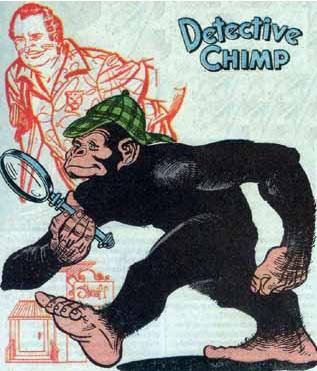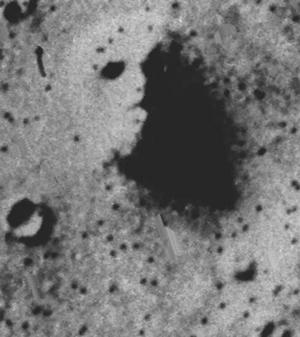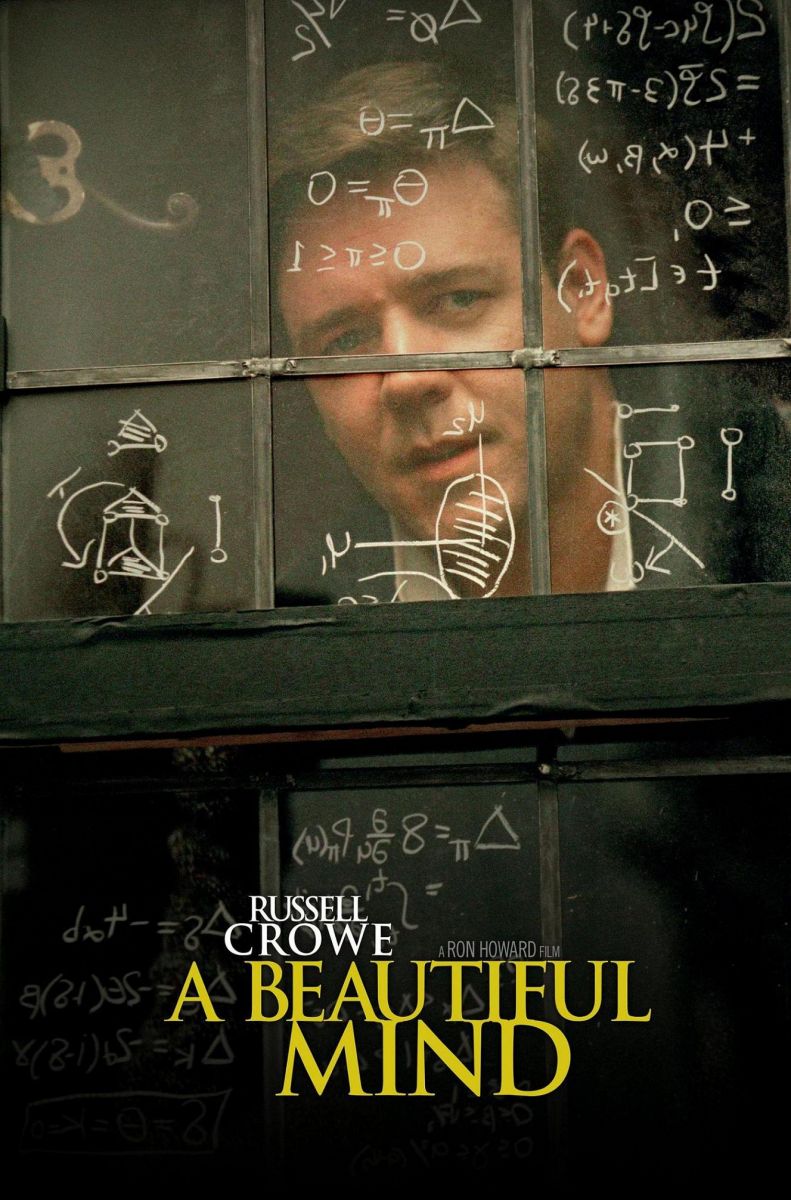 Detective Chimp makes no sense. If you’re thinking, well yeah, he’s a talking chimp, I’ll tell you that’s not the problem to me. I can accept the talking because he wouldn’t be a very compelling character without the ability to communicate but it’s the detective part that bugs me. Here’s why: cause and effect. Cause and effect seems so basic, it’s one of the underlying principles of all science, as well as superstition, and something we learn from a very young age. However, there seems to be something uniquely human about our ability to parse out cause and effect in a way that surpasses even our closest relatives.
Detective Chimp makes no sense. If you’re thinking, well yeah, he’s a talking chimp, I’ll tell you that’s not the problem to me. I can accept the talking because he wouldn’t be a very compelling character without the ability to communicate but it’s the detective part that bugs me. Here’s why: cause and effect. Cause and effect seems so basic, it’s one of the underlying principles of all science, as well as superstition, and something we learn from a very young age. However, there seems to be something uniquely human about our ability to parse out cause and effect in a way that surpasses even our closest relatives.
How did we get so good at this? Well we have thumbs and thumbs are useful for many things. They allow us to manipulate our environment in ways no other species could. We could chuck a stone, whack something with a stick or hold a pencil and draw a comic (ok, that last one came a bit later). Anthropologists think that it was this manipulation that allowed our brain to develop into such a pattern recognizing cause and effect machines. Being a detective relies on an understanding of cause and effect so subtle that you can do it in reverse, i.e. finding the cause of events when you can only see the effects, the effects being the various clues involved in the case. I’m skeptical a mere chimpanzee with its lack of total bipedalism (our hands developed as they did because we no longer needed them for moving around) would be able to develop such skills.
Understanding cause and effect has its downside though. It can breed superstition and make statistics a challenge to comprehend. Allow me to explain. One of the first lessons you learn in any statistics class is “correlation does not necessarily imply causation.” This is often misstated as “correlations doesn’t mean causation” which is wrong cause sometimes it does. Viewing the world through the lens of cause and effect means sometimes we assume something we saw created the effect we later witness, even when no actual connection exists. If you do a special dance before you board an aircraft, and that aircraft never crashes while you’re flying in it, then those two events are indeed highly correlated. If you believe that your dance has the power to prevent planes from falling out of the sky then you’ve created a superstition based on cause and effect implemented when it shouldn’t have been. It's a logical fallacy called post hoc ergo propter hoc (after that, therefore because of that), and you can use that Latin to really impress some friends.
But humans really can’t help themselves when it comes to this kind of thing. The favorite example among evolutionary biologists is a hypothetical story about an early human collecting water by the river. There’s a growl from a nearby bush. The skeptical human who inherently understands statistics realizes that the noise is likely from a small unthreatening animal and not a lion. The human that immediately assumes the noise came from a lion, which is less likely because there are fewer lions around since they’re apex predators, runs away screaming. Almost always running away is a waste of time, but sometimes it’s a lion and the skeptical dude gets eaten. Over enough time only those guys who run away make it home to the wife and we wind up a superstitious and cowardly lot. Now we’re just hard wired to be superstitious and to see patterns where there are none.

 But seeing patterns where there are none is what makes comic’s possible. If you’ve read Scott McCloud’s Understanding Comics he explains how this works. Everything you see on a comic book page is a representation of something else made with some lines and some color. Yet, our brain is so happy to find patterns and faces in the data of those lines that we see faces, human forms, and all other manner of objects drawn by the artist. It’s why Josh loves those minimalist artists like Peter Snejbjerg and Sean Phillips. Our brain actively seeks out the image of faces especially because we’re such social animals. We need to interact with other humans so recognizing when you’re standing in front of a new individual is an important skill. It’s so important our brain has a distinct area for recognizing faces. If this becomes damaged you can become face blind, where no other aspect of your vision is damaged but you no longer distinguish one face from another. This ability to find faces in data means you can see images in the clouds and other bits of random noise, which is known as pareidolia. How weird is it that reading comics requires tricking the brain the same way the “face” on Mars does?
But seeing patterns where there are none is what makes comic’s possible. If you’ve read Scott McCloud’s Understanding Comics he explains how this works. Everything you see on a comic book page is a representation of something else made with some lines and some color. Yet, our brain is so happy to find patterns and faces in the data of those lines that we see faces, human forms, and all other manner of objects drawn by the artist. It’s why Josh loves those minimalist artists like Peter Snejbjerg and Sean Phillips. Our brain actively seeks out the image of faces especially because we’re such social animals. We need to interact with other humans so recognizing when you’re standing in front of a new individual is an important skill. It’s so important our brain has a distinct area for recognizing faces. If this becomes damaged you can become face blind, where no other aspect of your vision is damaged but you no longer distinguish one face from another. This ability to find faces in data means you can see images in the clouds and other bits of random noise, which is known as pareidolia. How weird is it that reading comics requires tricking the brain the same way the “face” on Mars does?
If this pattern recognizing gets really out of control it can become schizophrenia. If you’re convinced that you’re constantly surrounding by hidden meaning in bits of data, coded messages in the newspaper, everyone around you out to get you, and other grand conspiracies that’s not a good thing. It is correlation combined with cause and effect taken to its most extreme to the point which then ceases to be useful at all.
I think all this means, in the world of wild speculation, that if a chimp could learn cause and effect maybe they would be less prone to fallacious associations we humans seem determined to make. If that were the case then a chimp might make a better detective than even a bat. No superstition, no grand conspiracies, just evidence leading to logical conclusions. Human detectives strive to do this but maybe, just maybe, a chimp could do it better. In truth, animals are prone to superstitious behavior too, but for once I'm going to stick with a bit of fantasy over reality. Being a detective in our world is hard enough but think about the DCU, with all its magic and crazy off-world tech. Grant Morrison fired a bullet through time! To murder a god! A detective in that world needs all the logic-based help he or she can get.
At the end of the day he’s a magical talking chimp that solves mysteries, which just makes me want to shout “hooray comics!” for being so wonderfully weird and fun.
Ryan Haupt can’t believe he actually convinced himself by the end of the article that a chimp would make a good detective. Here him monkey around with his other troupe on the podcast Science… sort of.


Very interesting article. I don’t particularly care about Detective Chimp, but your discussion of pattern recognition and its applications is very solid. Nice work.
P.S. I saw John Nash and thought I was going to get an article about Game Theory. You got me excited.
“correlation does not necessarily imply causation.” – Hume said this first, right?
Hume says there is no cause and effect. They’re two distinct events. We call them cause and effect, and like to believe that incident (a) was responsible for incident (b)’s occurance, because of a habitual association in our minds. It has always happened like this, therefore it will always happen like this, we surmize. In actual fact we are unjustified in doing so.
That aside, great article! I no nothing about detective chimp, but he sounds awesome!
This was a great article. I love articles like this, that bring up interesting points and leave me thinking. Or rubbing my chin and drinking coffee and nodding as I say "Ah interesting, I see" in my best Jeff Goldblume.
The other thing about Detective Chimp, wouldn’t be be getting chimp hair and leaving foot prints all over the crime scene? I have to imagine he does more harm then good. Even if he finds the real culprit, I have to believe there’d be some much evidence tampering (not on purpose of course) that any court of law would have to throw the case out.
Best chimp moment: Batman and Detective Chimp talking in a chat room in Paul Dini’s Detective run, still makes me laugh.
Detective Chimp is one of my favourite DC characters. More books should include him.
This article made me think of Isaac Asimov’s idea of Psychohistory from the Foundation series, which is a really silly, silly idea (perhaps, Chaos Theory makes me think this way); but at the same time is great fun. I have to admit sometimes if an idea is really wacky I can just love it because it does flying the face of what really shouldn’t be the case. (No hate mail, please, I do love it) It’s just such an insane idea, but makes for some really fun science fiction. Perhaps like having John Carter running around Mars. It’s just so over the top, that I can’t help but like it.